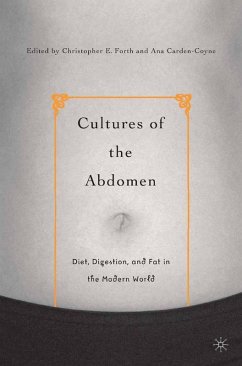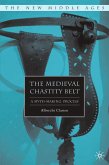We live in a world obsessed with abdomens. Whether we call it the belly, tummy, or stomach, we take this area of the body for granted as an object of our gaze, the subject of our obsessions, and the location of deeply felt desires. Diet, nutrition, and exercise all play critical roles in the development of our body images and thus our sense of self, not least because how we are made to feel about bodies (both our own and those of others) is often grounded in dietary and lifestyle choices. Cultures of the Abdomen traces the history of social, cultural, and medical ideas about the stomach and related organs since the seventeenth century, and demonstrates that a focused study of the abdomen is necessary for understanding the deep historical meanings that underscore our contemporary obsessions with hunger, diet, fat, indigestion, and excretion. It locates that history from dietary ideals in early modern Europe to the vexing issue of American fat in the twenty-first century, surveying along the way developments in Britain, France, Germany, Italy, and Russia.
Dieser Download kann aus rechtlichen Gründen nur mit Rechnungsadresse in A, B, BG, CY, CZ, D, DK, EW, E, FIN, F, GR, HR, H, IRL, I, LT, L, LR, M, NL, PL, P, R, S, SLO, SK ausgeliefert werden.
"The editors of Cultures of the Abdomen have assembled an imaginative mix of social, cultural, and medical histories that illuminate how past discussions of digestion, diet, and body shape have informed modern gender ideals, health, selfhood, and personal values. We learn here how the exterior form of the belly has come to reflect not only what goes into and out of it, but has also become a reliable sign of our inner nature. By adding corpulence and character to the ancient connection between health and dietetics, these essays literally tap into the guts of our contemporary obsession with eating and body image." - Robert A. Nye, Oregon State University
"This is a stimulating excursion through the human alimentary tract that explores the complex intertwinings of Western attitudes toward eating and eliminating with the anxieties generated by the growth of urban, industrial civilization. The ideology of the abdomen is shown to have stimulated and responded to contemporary notions of health, character, and intellect, and to have sown confusion over gender identification and sexual appetite. Physiology and medicine, philosophy and literature, even the world of commerce, are probed to illuminate the preoccupation of the past three centuries with the appearance and experience of the belly." - James Whorton, Professor of Medical History, University of Washington
"If 'food' is the new 'sex' in cultural studies, then this cultural history should be consumed as soon as possible. Linking diet, the body, and the self in deeply and carefully historicized ways, it spans the modern period from the Enlightenment to the present, from 'weight loss in the age of reason' to 'fat is a feminist issue.' It draws together key younger and established scholars for whom culture, history, and the abdomen yield intriguing and important insights into modern sensibilities." - Alison Bashford, The University of Sydney
"This is a stimulating excursion through the human alimentary tract that explores the complex intertwinings of Western attitudes toward eating and eliminating with the anxieties generated by the growth of urban, industrial civilization. The ideology of the abdomen is shown to have stimulated and responded to contemporary notions of health, character, and intellect, and to have sown confusion over gender identification and sexual appetite. Physiology and medicine, philosophy and literature, even the world of commerce, are probed to illuminate the preoccupation of the past three centuries with the appearance and experience of the belly." - James Whorton, Professor of Medical History, University of Washington
"If 'food' is the new 'sex' in cultural studies, then this cultural history should be consumed as soon as possible. Linking diet, the body, and the self in deeply and carefully historicized ways, it spans the modern period from the Enlightenment to the present, from 'weight loss in the age of reason' to 'fat is a feminist issue.' It draws together key younger and established scholars for whom culture, history, and the abdomen yield intriguing and important insights into modern sensibilities." - Alison Bashford, The University of Sydney









